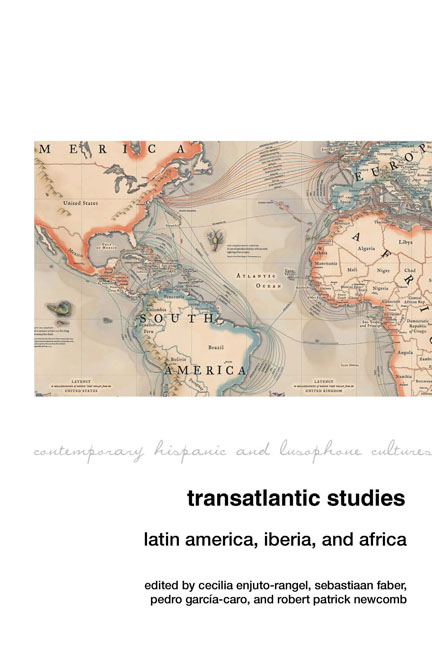Book contents
- Frontmatter
- Contents
- Introduction: Transatlantic Studies: Staking Out the Field
- Transatlantic Methodologies
- Transatlantic Linguistic Debates
- Transatlantic Displacement
- Transatlantic Memory
- Transatlantic Postcolonial Affinities
- Transatlantic Influence
- Epilogue: The Futureâif There Is OneâIs Transatlantic
- Index
4 - Iberian Studies: The Transatlantic Dimension
- Frontmatter
- Contents
- Introduction: Transatlantic Studies: Staking Out the Field
- Transatlantic Methodologies
- Transatlantic Linguistic Debates
- Transatlantic Displacement
- Transatlantic Memory
- Transatlantic Postcolonial Affinities
- Transatlantic Influence
- Epilogue: The Futureâif There Is OneâIs Transatlantic
- Index
Summary
The emergence of Iberian Studies as a challenge to the paradigm of Hispanism has not only forced a re-examination of the cultural and linguistic relations within the Iberian Peninsula, but also raised some questions (and anxieties) about the significance of the transatlantic dimension in our field. For some critics, Iberian Studies may be understood as a strategic move to revamp the old-fashioned Peninsularism, as an attempt to regain intellectual prestige and institutional status within the Anglo-American academy by presenting the study and teaching of the European side of the Hispanic Atlantic as being relevant on its own, and Spain as a rightful member of the globalized world—without having to resort, as has been the case in the past, to the allure and the exoticism of being a romanticized other on the periphery of Europe or to interest in the Spanish-speaking Americas to justify its contribution to the service of language instruction. If the decisive surge of Latin Americanism in the 1960s and 1970s displaced Peninsular studies from a central position in our field (at least within certain institutional frameworks), Iberian Studies could be the white knight arriving to save the day—or so the reasoning goes. According to Sebastiaan Faber,
Iberian cultural studies can, at least in part, be seen as an attempt by leading figures in Peninsular Hispanism—particularly in Britain and the United States—to reinvent and reinvigorate a field that had long found itself marginalized, and to overcome the disciplinary ideologies and practices that contributed to that marginalization. Iberian cultural studies arose, I contend, not only from a desire for a disciplinary renewal […] but also from an aspiration to bolster the field's institutional status. (2008a: 8)
A similar argument has been used in response to the increasing popularity of Transatlantic Studies. Thus, Joan Ramon Resina sees Transatlantic Studies as a response to the crisis of Peninsular Hispanism: “pressured by demography and by the presentism resulting from a narrow application of cultural studies, the field of Spanish […] has been losing historical depth,” and given “the growing hegemony of Latin American literature [… ,] a ‘new field’ in ‘trans-Atlantic studies’ has arisen, permitting ‘Peninsularists’ to reposition themselves nearer the dominant Americanism” (2005: 96).
- Type
- Chapter
- Information
- Transatlantic StudiesLatin America, Iberia, and Africa, pp. 56 - 66Publisher: Liverpool University PressPrint publication year: 2019



